Antequera, Bohol
Antequera, officially the Municipality of Antequera, (Cebuano: Lungsod sa Antequera; Tagalog: Bayan ng Antequera), is a 4th class municipality in the province of Bohol, Philippines. According to the 2015 census, it has a population of 14,425 people.[4]
Antequera | |
|---|---|
| Municipality of Antequera | |
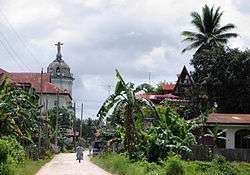 Antequera, Bohol | |
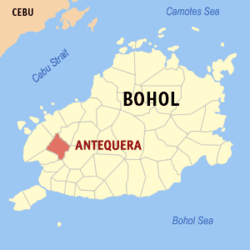 Map of Bohol with Antequera highlighted | |
OpenStreetMap 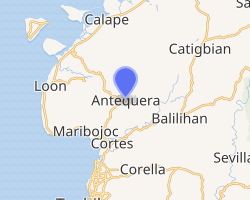
| |
.svg.png) Antequera Location within the Philippines | |
| Coordinates: 9°46′52″N 123°53′51″E | |
| Country | |
| Region | Central Visayas (Region VII) |
| Province | Bohol |
| District | 1st District |
| Founded | 17 March 1876 |
| Barangays | 21 (see Barangays) |
| Government | |
| • Type | Sangguniang Bayan |
| • Mayor | Lilioso M. Nunag |
| • Vice Mayor | Jose Mario J. Pahang |
| • Congressman | Edgardo M. Chatto |
| • Electorate | 9,725 voters (2019) |
| Area | |
| • Total | 118.60 km2 (45.79 sq mi) |
| Elevation | 94.2 m (309.1 ft) |
| Population (2015 census)[4] | |
| • Total | 14,425 |
| • Density | 120/km2 (320/sq mi) |
| • Households | 3,478 |
| Economy | |
| • Income class | 4th municipal income class |
| • Poverty incidence | 18.43% (2015)[5] |
| • Revenue (₱) | 70,421,976.30 (2016) |
| Time zone | UTC+8 (PST) |
| ZIP code | 6335 |
| PSGC | |
| IDD : area code | +63 (0)38 |
| Climate type | tropical monsoon climate |
| Native languages | Boholano dialect Cebuano Tagalog |
| Website | www |
Located 18 kilometres (11 mi) north of Tagbilaran, popular places of interest in Antequera are the weekly basket market and Mag-Aso Falls. The Mag-Aso falls, whose cascading waters run into natural pools, were greatly altered by the 2013 Bohol earthquake and even more so by flash floods caused by Tropical Storm Seniang in December 2014.[6]
History
The early inhabitants of the area were the Eskaya people, who lived in western Bohol, including the lowlands of Antequera at the present barangay of Viga, from the 7th century until the early 17th century. One legendary Eskaya leader was King Lomod or Tamblot, who raised a revolt against the Spanish conquistadors.[7]
Originally the town was a barangay of Maribojoc known as Agad. Migration from surrounding coastal areas increased the population and created many new sitios. On 17 March 1876, the Governor-General of the Philippines signed a decree that made Agad and all its sitios a new municipality. That same year, the governor of the district of Bohol, Joaquin Bengoechia, enacted the law that finalized the boundaries and appointed its first mayor, Simeon Villas. The new municipality was named after the home town in Spain of Bengoechia.[7]
In 1899, the town of Catigbian was abolished, and the barangays of Caimbang, San Isidro, and Causwagan were added to Antequera. But it lost these barangays, along with half of Cansague, when Catigbian was reestablished on 17 June 1949. On 10 January 1970, the municipality of San Isidro was formed, taking the barangays of Cambansag, Abehilan, and Baunos from Antequera.[7]
Barangays
Antequera comprises 21 barangays:
| PSGC | Barangay | Population | ±% p.a. | |||
|---|---|---|---|---|---|---|
| 2015[4] | 2010[8] | |||||
| 071204001 | Angilan | 6.6% | 947 | 1,012 | −1.26% | |
| 071204002 | Bantolinao | 8.8% | 1,274 | 1,226 | 0.73% | |
| 071204003 | Bicahan | 5.3% | 766 | 783 | −0.42% | |
| 071204004 | Bitaugan | 4.3% | 622 | 591 | 0.98% | |
| 071204005 | Bungahan | 5.8% | 832 | 744 | 2.15% | |
| 071204007 | Canlaas | 4.5% | 650 | 736 | −2.34% | |
| 071204008 | Cansibuan | 3.9% | 569 | 512 | 2.03% | |
| 071204009 | Can‑omay | 3.8% | 543 | 721 | −5.26% | |
| 071204010 | Celing | 4.7% | 684 | 671 | 0.37% | |
| 071204011 | Danao | 3.3% | 473 | 453 | 0.83% | |
| 071204012 | Danicop | 4.6% | 659 | 576 | 2.60% | |
| 071204013 | Mag‑aso | 2.8% | 407 | 434 | −1.22% | |
| 071204014 | Poblacion | 9.7% | 1,404 | 1,332 | 1.01% | |
| 071204015 | Quinapon‑an | 2.0% | 283 | 278 | 0.34% | |
| 071204016 | Santo Rosario | 3.7% | 528 | 475 | 2.03% | |
| 071204017 | Tabuan | 4.0% | 579 | 584 | −0.16% | |
| 071204018 | Tagubaas | 3.2% | 456 | 386 | 3.22% | |
| 071204019 | Tupas | 5.9% | 850 | 935 | −1.80% | |
| 071204020 | Ubojan | 3.1% | 450 | 529 | −3.03% | |
| 071204021 | Viga | 4.1% | 586 | 614 | −0.88% | |
| 071204022 | Villa Aurora (Canoc‑oc) | 6.0% | 863 | 889 | −0.56% | |
| Total | 14,425 | 14,481 | −0.07% | |||
Climate
| Climate data for Antequera, Bohol | |||||||||||||
|---|---|---|---|---|---|---|---|---|---|---|---|---|---|
| Month | Jan | Feb | Mar | Apr | May | Jun | Jul | Aug | Sep | Oct | Nov | Dec | Year |
| Average high °C (°F) | 28 (82) |
28 (82) |
29 (84) |
31 (88) |
31 (88) |
30 (86) |
29 (84) |
29 (84) |
29 (84) |
29 (84) |
28 (82) |
28 (82) |
29 (84) |
| Average low °C (°F) | 22 (72) |
22 (72) |
22 (72) |
23 (73) |
24 (75) |
24 (75) |
24 (75) |
24 (75) |
24 (75) |
23 (73) |
23 (73) |
22 (72) |
23 (74) |
| Average precipitation mm (inches) | 102 (4.0) |
85 (3.3) |
91 (3.6) |
75 (3.0) |
110 (4.3) |
141 (5.6) |
121 (4.8) |
107 (4.2) |
111 (4.4) |
144 (5.7) |
169 (6.7) |
139 (5.5) |
1,395 (55.1) |
| Average rainy days | 18.6 | 14.8 | 16.5 | 16.7 | 23.9 | 26.4 | 25.6 | 24.1 | 24.4 | 26.3 | 23.7 | 20.5 | 261.5 |
| Source: Meteoblue [9] | |||||||||||||
Demographics
| Population census of Antequera | |||||||||||||||||||||||||||||||||||||||||||||||||
|---|---|---|---|---|---|---|---|---|---|---|---|---|---|---|---|---|---|---|---|---|---|---|---|---|---|---|---|---|---|---|---|---|---|---|---|---|---|---|---|---|---|---|---|---|---|---|---|---|---|
|
| ||||||||||||||||||||||||||||||||||||||||||||||||
| Source: Philippine Statistics Authority[4][8][10][11] | |||||||||||||||||||||||||||||||||||||||||||||||||
Economy
The primary economic activities are farming, handicraft or cottage industries (especially basket weaving), and carpentry (including bamboo and wood furniture making). Its main agricultural produce comprises coconut, rice, corn, rootcrops, and vegetables.[12]
Total annual income in 2010 was ₱35,960,730
Local government
List of former mayors of Antequera:[13]
- Vicente Tambis - 1896–1897
- Julian Calipes - 1909–1911
- Pedro Omila - 1912–1915
- Eufemio Morgia - 1919–1922
- Eustaquio Tambis - 1922–1925
- Eufemio Morgia - 1926–1934
- Luis Gementiza - 1934–1937
- Luis Gementiza - 1938–1940
- Demetrio Jadulco - 1940–1941
- Leoncio Paña - 1943–1945
- Eufemio Morgia - 1944
- Demetrio Jadulco - 1945–1946
- Luis Gementiza - 1946–1951
- Sabino Rebosura - 1952–1963
- Conrad Vallestero - 1963
- Isabelito Tongco - 1964–1992
- Vicente Nunag - 1987–1988
- Arnulfo Labendia - 1992
- Felipe Gementiza - 1992–1998
- Samuel Rebosura - 1998–2007
- Cecelia Rebosura - 2007–2010
- Jose Mario Pahang - 2010–2019
- Lil Nunag - 2019–present
Gallery
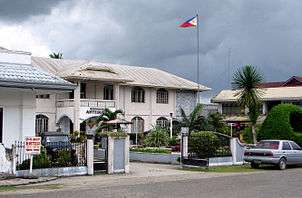 Town hall
Town hall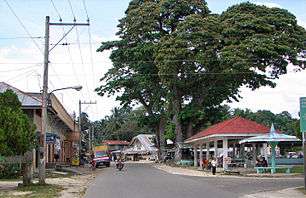 Poblacion
Poblacion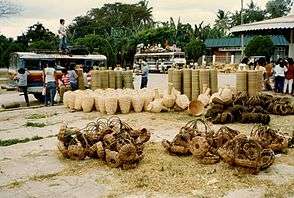 Basket market
Basket market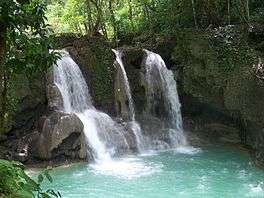 Mag-Aso Falls
Mag-Aso Falls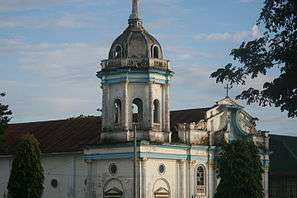 View of church
View of church
References
- "Municipality". Quezon City, Philippines: Department of the Interior and Local Government. Retrieved 31 May 2013.
- "Province: Bohol". PSGC Interactive. Quezon City, Philippines: Philippine Statistics Authority. Retrieved 12 November 2016.
- "Antequera, Bohol Profile". PhilAtlas.com. Retrieved 15 June 2020.
- Census of Population (2015). "Region VII (Central Visayas)". Total Population by Province, City, Municipality and Barangay. PSA. Retrieved 20 June 2016.
- "PSA releases the 2015 Municipal and City Level Poverty Estimates". Quezon City, Philippines. Retrieved 12 October 2019.
- The Bohol Chronicle 2015.
- Municipality of Antequera 2012b.
- Census of Population and Housing (2010). "Region VII (Central Visayas)". Total Population by Province, City, Municipality and Barangay. NSO. Retrieved 29 June 2016.
- "Antequera: Average Temperatures and Rainfall". Meteoblue. Retrieved 9 May 2020.
- Censuses of Population (1903–2007). "Region VII (Central Visayas)". Table 1. Population Enumerated in Various Censuses by Province/Highly Urbanized City: 1903 to 2007. NSO.
- "Province of Bohol". Municipality Population Data. Local Water Utilities Administration Research Division. Retrieved 17 December 2016.
- Municipality of Antequera 2012a.
- Municipality of Antequera 2012c.
Sources
- Municipality of Antequera. "Brief municipal profile". Archived from the original on 24 October 2012.CS1 maint: ref=harv (link) CS1 maint: unfit url (link)
- Municipality of Antequera, Russell Glenn L. Lomotos. "History of Antequera". Archived from the original on 24 October 2012.CS1 maint: ref=harv (link)
- Municipality of Antequera. "Antequera Mayors". Archived from the original on 24 October 2012.CS1 maint: ref=harv (link) CS1 maint: unfit url (link)
- "Waterfalls you must see in Bohol". boholchronicle.com.ph. The Bohol Chronicle. 26 April 2015. Archived from the original on 10 August 2015. Retrieved 13 May 2016.CS1 maint: ref=harv (link)
| Wikimedia Commons has media related to Antequera. |